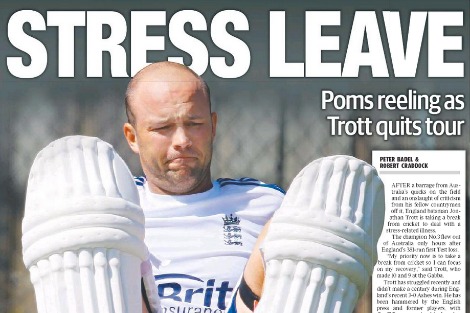
Beyond Blue chairman Jeff Kennett criticised some media coverage of England batsman Jonathan Trott's decision to withdraw from the Ashes due to stress that is related to his mental illness. 'If Jonathan Trott had broken his arm no one would have criticised him ... But because it's an illness that you can't see, people like to take cheap shots.'
But the media slurs against Trott were isolated and Kennett's message was also a positive one. 'We should be celebrating the fact that in this day and age, particularly a male, a high profile male, finds that he can declare that he has a stress-related illness and then seek help for it.'
In contrast to Sydney's Daily Telegraph, the London Daily Mail had a break out box in its coverage paying tribute to sports stars 'who fought mental illness'. These include former England batsman Marcus Trescothick, who commented on the Trott departure.
'I think people who hold those views [that he's soft] have generally not experienced it in any form. If you experience depression, then you totally understand and sympathise. It's debilitating, non-stop. It takes into account nothing at all — what house you live in, what car you drive, how much you earn, what job you do.'
Trescothick's fight with depression ended his international career in 2008. He'd had to return home repeatedly from international cricket events including the 2006 Ashes tour. At the time euphemisms were used to sanitise the reality, such as a statement that he was 'suffering from a sensitive medical condition'. But he later documented his mental illness in his autobiography Coming Back to Me, which won a major sports book prize in 2008.
During the past week in Australia, National Mental Health Commission commissioner Alan Fels overlooked the slurs against Trott and saw the consensus of reaction to his return home to England as positive: 'At last it's just seen as a normal health problem.'
Fels was doing media interviews to promote the launch of the Commission's second annual Report Card on Mental Health and Suicide Prevention. He sees the slowly changing attitude to mental illness as key to increasing the wellbeing of those who suffer as well as easing the burden of the illness on the community. To him it is nation building. 'We talk about nation building in terms of the physical infrastructure. What about the human infrastructure when so many people have a mental health problem.'
Although he cites improvements such as better data and the NDIS, in general he believes 'mental health remains a weak point in our society, our health system and our economy'. Only 25 per cent of young people and 15 per cent of young males with mental health problems are being treated. Forty-four Australians, on average, take their own lives each week, and Aboriginal and Torres Strait Islander peoples are two times more likely to die by suicide.
Perhaps our mental health is no better than that of populations in developing countries that are regarded as economic basket cases. Clearly Australia is a developing country in terms of mental health. The progress of our development will, says Fels, depend upon our ability to 'find a better way to support good mental health and recovery based on early intervention and investment in social supports and services across people's lives'.
This, in tandem with recognising sports people such as Trott as heroes for having the courage to quit and return home when they know that's what their illness demands of them.
 Michael Mullins is editor of Eureka Street.
Michael Mullins is editor of Eureka Street.